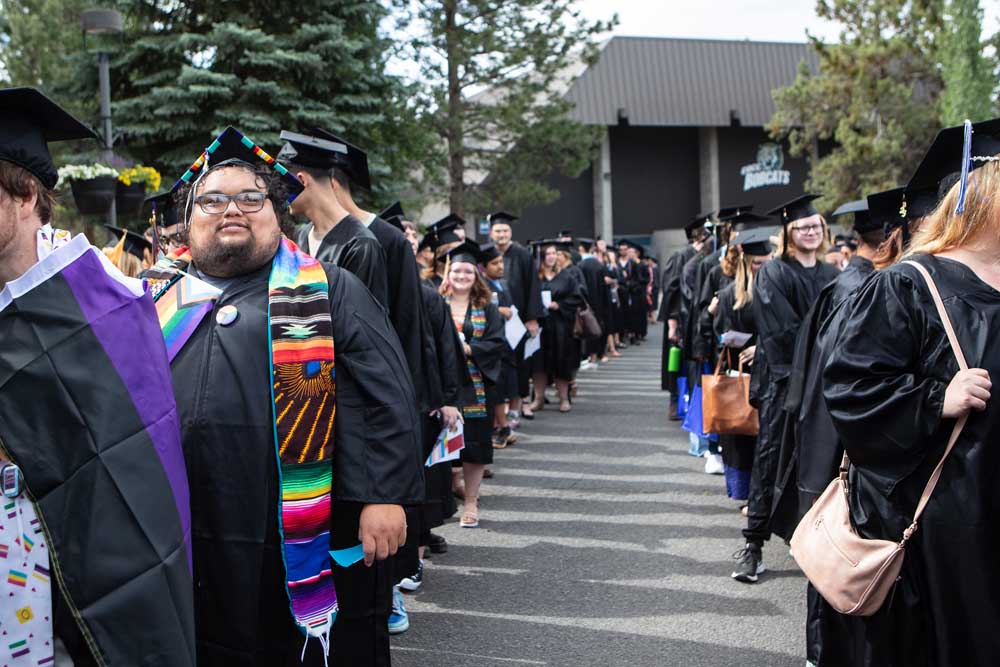Homeless student government president graduates Central Oregon Community College
Published 6:30 am Tuesday, June 20, 2023

- Daniel "Dray" Aguirre waits with fellow graduates to march in Central Oregon Community College’s commencement ceremony on Saturday at the campus in Bend.
Daniel “Dray” Aguirre almost didn’t graduate.
For months, he balanced coursework, an on-campus job and an hour-long commute between the Central Oregon Community College Bend campus and Prineville, where he was taking care of his sick grandmother. For years, he had struggled to get by while living in a dilapidated trailer in the woods between Tumalo and Sisters.
Less than a month before his commencement ceremony at COCC, the 33-year-old student, who experiences homelessness, was hospitalized with chest pain. Doctors at St. Charles Prineville told him he had suffered a minor stroke, likely caused by stress, he said.
Aguirre fought through it all. On Saturday, he donned a cap and gown and beamed as he crossed the stage during commencement. Yelling triumphantly and pointing toward loved ones in the crowd, he received his associate of general studies degree. His plan is to go into public health.
“I don’t call places home, being homeless,” said Aguirre, who identifies as Native American and Latino. “But COCC is my home.”
Homeless college student is vocal advocate for Central Oregon houseless
From challenges to advocacy
Graduating college can be difficult for any student, but especially for unhoused community college students like Aguirre, whom The Bulletin wrote about as part of its year-long Faces of Homelessness series. There are thousands in Oregon, a recent survey said. Each day, they must navigate passing their classes while trying to fulfill their basic needs: food, shelter, health, hygiene and more.
Central Oregon homeless college student elected president, moves into dorm
So in school, Aguirre made advocacy his mission. He lobbied in Salem and Washington, D.C., seeking funding to support underserved students like him. He ran for student government president and won. He helped establish an on-campus food pantry, complete with various necessities: hygiene products, toilet paper and diapers.
He joined a variety on-campus clubs that supported diversity. On Saturday, he wore a multicolored graduation stole, decorated with symbols of various marginalized groups.
His efforts had, at last, paid off. He’s the first of his immediate family members to graduate college. Students, teachers and mentors approached him, hugged him and thanked him. His mother, Magi, helped him fix his curly brown hair around his stole.
“He’s made a big impact,” she said.
“It’s been a long, rough road for him,” she added. Then she hugged him and said: “Proud of you, Bubba.”
‘No shame in asking for help’
Throughout school, Aguirre used financial aid to pay for school, books, gas, phone bills, car repairs, toothbrushes, cleaning supplies and mouse traps. For years, he slept in a hole-ridden trailer, keeping warm with a propane Mr. Heater that could have poisoned him. Mice stole his food. He had no restroom or shower.
“The guy’s been through a lot, but he doesn’t let it get him down,” said Jared Early, a longtime friend.
And he knows how hard it is to ask for help and accept it. However, he emphasized, that’s what got him through college, the support from friends, family and faculty. They called him up just to check on him. They lent him a few bucks for gas so he could get to class. They told him he was almost there, nearly done with school.
“That’s what really helped me push forward,” he said, adding: “I know who I can turn to for anything I need.”
His message to other students: “There’s no shame in asking for help. It’s hard. I get it.”
For Aguirre, the days leading up to the ceremony were filled with happiness, excitement, nerves and mixed feelings. Part of the reason Aguirre was so involved on campus was so he could stay there. Campus was his escape from the run-down trailer where he lived in the woods before he lived in a dorm for two terms.
He knows things will be different now that he’s done with school.
He hopes to work on the Warm Springs Indian Reservation with Indigenous people like him. He’ll live with his grandmother while continuing his search for housing and work. Eventually, he hopes to return to school and finish the college’s nursing program. And one day, he aspires to run for the board of Central Oregon Community College.
While Aguirre held a door open to the on-campus cafeteria on Saturday, a student said: “Dray, you’re so generous. You’re always taking care of us.”
He said, “That’s because it’s not about me.”








